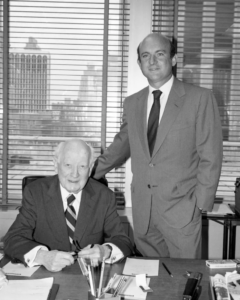At CMG, we’ve seen firsthand how important timely communication and transparency are within a family business. It’s common for families to avoid difficult discussions. Often this evasion is well-intentioned; it’s an attempt to avoid conflict or damaging relationships. But not having those challenging conversations can also lead to even bigger consequences down the road. Conversely, approaching an important conversation without preparing properly can also be damaging. A good conversation at the wrong time is a bad conversation. Even the most valuable conversations can do more harm than good under adverse circumstances, and even well-thought-out conversations can fall flat if none of those communicated plans are put into motion before due time.
These are the issues that led to trouble for the Robinson family, who started the Scholastic empire.
Dick Robinson inherited Scholastic from his father, the company founder. After a lifelong career dedicated to learning and literacy, Dick died unexpectedly in 2021 while still leading the family business. When his wishes for the company were revealed in his will, they shocked everyone affected. Dick hadn’t left the century-old company to either of his sons, Ben or Reece, as his father had left it to him. Instead, Dick’s will left Scholastic, and all of his personal possessions, in the control of Iole Lucchese, Scholastic’s Chief Strategy Officer.
This surprising decision shifted the business outside of the family for the first time in its history. The New York Times reported that it put Scholastic “in an extremely unusual position for a public company: adapting to a succession plan many key players did not know was coming.” His sons did not know this shift was coming either, and they were left in shock and dismay. It turns out the Robinson family had never had those imperative conversations about what the future would look like. The next generation didn’t know their father’s intentions until it was too late to discuss them.
How could this situation have been handled more effectively for the benefit of both the Robinson family and its business?
First, a bit of background.

A history of founder to son
In October 1920, Maurice R. Robinson Sr. founded Scholastic in his parents’ home in Wilkinsburg, Pennsylvania. The company grew steadily, expanding globally into Canada and beyond. Maurice’s son, Dick, joined as an assistant editor in 1964. He was elected President of Scholastic 10 years later, CEO a year after that, and Chairman of the Board in 1982.
Under Dick’s leadership, Scholastic became the largest publisher and distributor of children’s books worldwide. He expanded the company into producing and creating entertaining and educational children’s media — and became a global leader in these areas. He led them to become a global leader in providing print and digital educational materials. Under Dick, Scholastic broke publishing records and developed many popular children’s series. He received numerous honours and awards in his illustrious career. By all accounts, he deeply loved the company his father had built, and was instrumental in taking it to extraordinary new heights.
A sudden loss for the family
During a stroll in Martha’s Vineyard in June 2021 with his former wife Helen Benham, their 25-year-old son Reece, and the family dog Darla, 84-year-old Dick suddenly collapsed and died. His death was unexpected as he was healthy and had been talking about plans for his future. He was still fully in charge of all day-to-day operations at Scholastic. He was completely devoted to the company; colleagues stated that Scholastic was “his life.”
Dick had never publicly named a successor. After his death, it was unclear for weeks who was in control of the company. When his will was distributed, his then 34-year-old son Ben said it “served as salt in an open wound.”
Signed in 2018, Dick’s will left his controlling stake in Scholastic (53.8% of the company’s Class A stock) to long-time senior executive Iole Lucchese. It also appointed her Chair of the Board. She now controlled Scholastic, making her one of the most powerful and wealthy people in the publishing industry. Lucchese also inherited all of Dick’s estate and was named a co-executor of his will (alongside a member of the Scholastic Board). Dick gave her sole discretion over whether to distribute any of his personal possessions to his sons, “with the request, but not the direction” that she give items “as she believes to be in accordance with [his] wishes.”

The right move for the company
When Dick’s will was read, it was the first time his plans for the future of Scholastic were communicated to those they affected most. It wasn’t just the next generation of Robinsons who were caught off guard by the contents of the will. The news took Iole Lucchese by surprise, too. Being handed control of the global children’s publishing, education, and media company was entirely unexpected for her.
A 30-year veteran with a proven track record of success at Scholastic, Lucchese is a Toronto-born first-generation university graduate. She began her career at the company in 1991 as a junior editor and ascended the ranks to senior leadership as Chief Strategic Officer and Executive Vice President.
While she was not a Robinson bloodline successor, her accomplished tenure at Scholastic meant her leadership represented a different kind of continuity for the company. In her New York Times interview, she said: “Dick understood that I shared his passion for Scholastic, and what this company means to the teachers we serve, to the children we serve, to everyone. He trusted me with that legacy, and I think it’s because we worked together and he knew that we were aligned.”
Dick’s decision was in the best interest of Scholastic. He left it in the capable hands of a successor with a long history at the company. Lucchese has proven to achieve amazing results, lifting Scholastic’s operating and net margins significantly with her focus on innovation and evolving the business for the digital age. Under Lucchese’s leadership, Scholastic has grown to new heights. With an annual revenue of US$1.64 billion and more than 8,000 employees worldwide, it distributes one of every three children’s books purchased in the United States. Scholastic products are translated into 65 languages and exported to over 150 countries.
The missing step
Leaving the company to a talented colleague who loved and understood it in the same way as Dick did has proven to be a positive decision for Scholastic. But for the Robinson family, it was a different story. Dick missed a fundamental step in his planning: he never engaged his family in meaningful discussions about succession. He did not prioritize preparing his sons — the Robinson family’s next generation — for the future he envisioned for Scholastic.
Dick’s sons had limited involvement with the company, having each pursued their own career paths. Reece (28) is a documentary filmmaker and Ben (37) operates a sawmill and workshop. They had expressed interest in the business and had discussions with their father about becoming more involved in recent years. But these conversations never led to actions or next steps, and there was no discussion of succession plans whatsoever. Even though the conversations were well-intentioned, they were at the wrong time. Again, a good conversation at the wrong time is a bad conversation. In the end, they never found the right time. Ultimately Reece and Ben learned the company’s future from their father’s will rather than from their father himself, and it was too late to have a good conversation about it.
Dick’s lack of communication and transparency with his family left them outraged when his plans were revealed after his death. As CMG Principal Vincent Valeri puts it, “When planning is not shared with the people it impacts, this is the net result.” Not finding the right time to have the conversation led to negativity and conflict that affected his loved ones and the beloved business he had dedicated his life to building.
The aftermath
It stands to reason that Dick Robinson’s sons were not given operational control of Scholastic, as neither had a career there. But they were devastated to be disinherited by their father with whom, by all reports, they had an amicable relationship. The family began to review legal options.
The sons planned to take a conciliatory approach, but friction quickly escalated. According to legal filings, Ben declined to sign a document waiving his right to contest his father’s will. Ms. Lucchese’s legal team sent the brothers a court summons shortly after. Ben and Reece responded by asking for documents regarding the will and the right to examine related witnesses. They stated that Dick had pledged years ago that the brothers would inherit the Scholastic legacy in return for borrowing US$2 million from their mother, Helen. The family has repeatedly stated its belief that Dick was working on a new will at the time of his death.

Scholastic today — and reflections from CMG
Today, Iole Lucchese is Chair of the Board, Executive Vice President, Chief Strategy Officer of Scholastic and President of Scholastic Entertainment. On July 20th of last year, Scholastic released its fiscal 2023 results with income up 40 percent, improved results in all segments, and US$161 million returned to shareholders.
The company may be thriving, but the Robinson family legacy bears a scar. Dick’s family felt hurt and blindsided by his decisions. His death and his loved ones’ mourning were overshadowed by legal battles and media speculation. And the early days of Lucchese’s leadership were marked by strife and turmoil.
What this demonstrates for us here at CMG is how crucial it is to keep the next generation informed about what is expected of them — or not. As Vincent states, “It’s the owner’s responsibility to prepare the next generation of owners.” This could be teaching them how to run the business once the time comes, or giving them all of the relevant information and explanations about why they will not be included in the plans for the future of the company.
It also demonstrates how important it is to find the right time for the conversation. Dick never found the right time to communicate his plans to his sons, directly or posthumously, and left them with a lot of lingering doubts, concerns, and resentments. They struggled to come to terms with what they didn’t understand. His succession plan prioritized his company and his estate after his death, but failed to take care of his family’s legacy and well-being. He didn’t think through the reality of the plan being put into action, and failed to understand what Vincent refers to as the “unintended consequences”.
By leaving his family out of the process and not communicating with the people impacted by his plans, the stage was set for many negative and preventable unintended consequences. Dick’s family and Iole Lucchese all faced unintended consequences in the form of litigation, estate challenges, bitter feelings, and more questions than answers about Dick’s feelings towards his family. As Vincent emphasizes, this is why we analyze potential outcomes by “running the game film” at CMG. Exploring the impacts of the plan is a crucial part of building the plan itself.
The Robinson family’s story serves as a compelling reminder for business families of the importance of open and transparent communication, robust and thoughtful planning, and involving the next generation throughout the planning process.
While the Scholastic brand continues to thrive by providing education and resources through its stories, the Robinson family’s legacy hangs in the balance. Perhaps, the family has unknowingly written a story of its own: a cautionary tale for other family-run businesses illustrating how it’s crucial to think and act proactively to ensure a smooth transition. Doing so can help to preserve both business operations and family harmony.
Questions to consider:
- Does your family know how to have difficult conversations safely and respectfully?
- Do you communicate your plans for the future with your children, family, and executors?
- The people that will need to take over in the future — have you invited them into the decision-making today?
